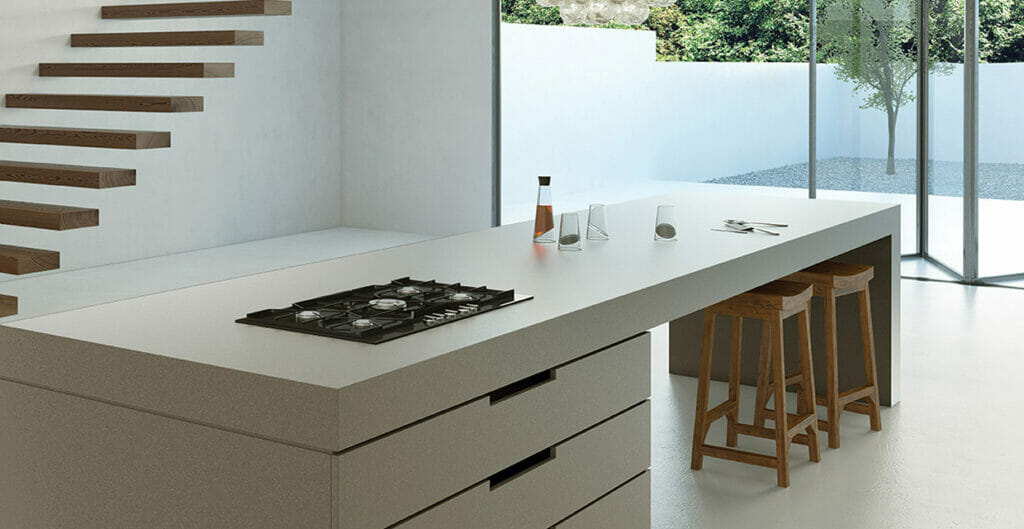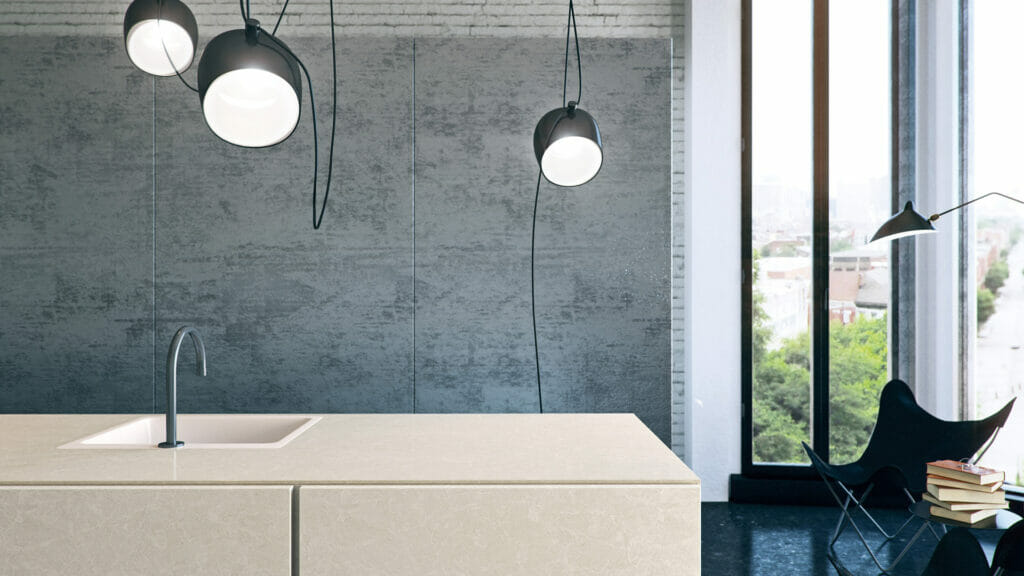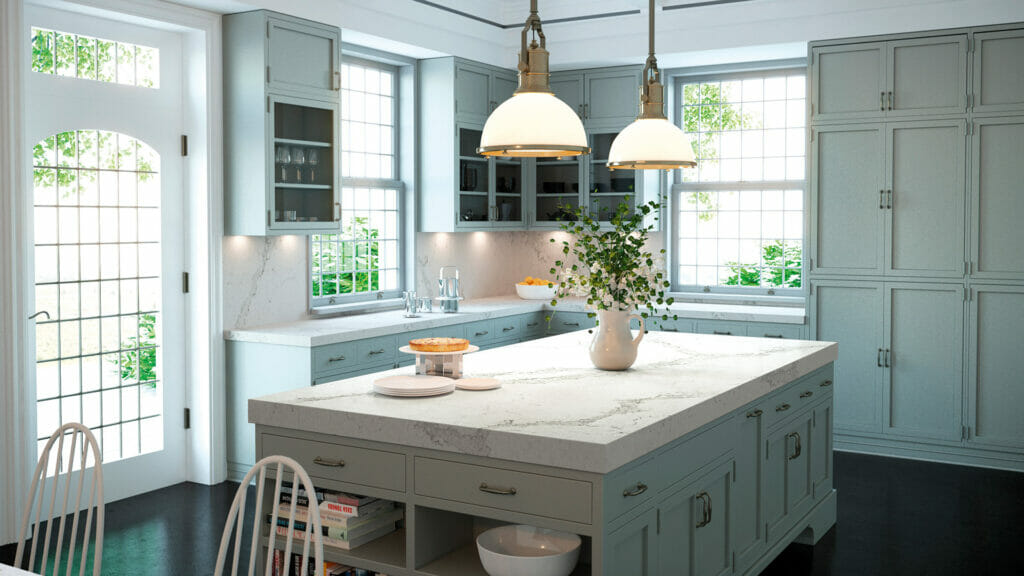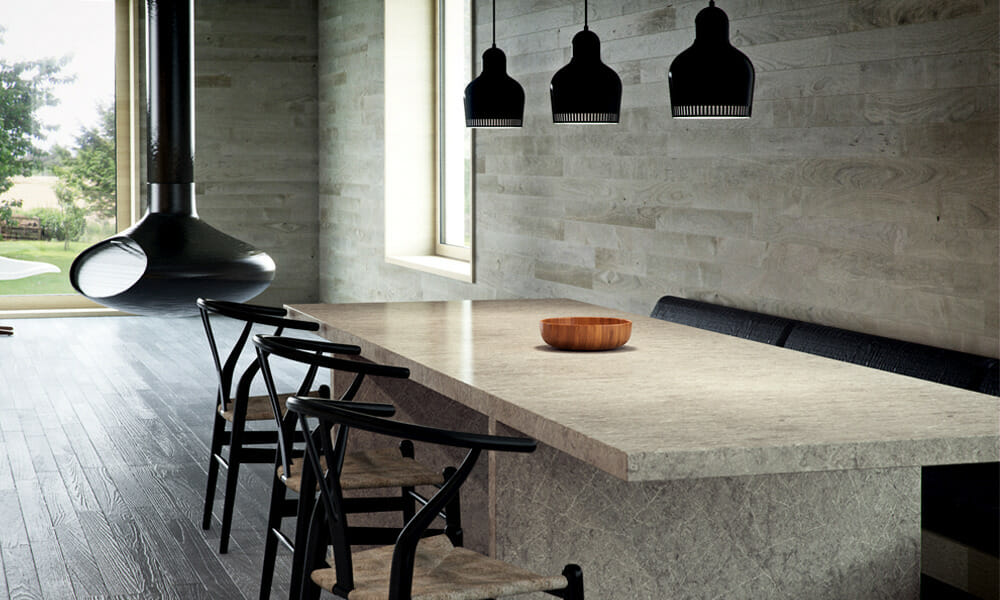Countertop Materials: Choosing the Right One for You
8 min read
For the inexperienced (or those who have been out of the market for a while), sorting through countertop materials can be a daunting task. There are so many out there, each with advantages and disadvantages.
In this post, we’ll provide some insights that will help you dramatically thin the herd and choose the top countertop materials for your kitchen.
Countertop Materials: How to Analyze Your Options

We’d be remiss not to preface this article by stating that while there are many popular materials used for countertops, industry experts all agree that one is superior. As you read on, which one that is will become abundantly clear.
We’ll be analyzing the field of options by considering the whole picture, namely the following factors:
Without further ado, let’s get started.
Central to the popularity of acrylic countertops is their ability to fit into many different kitchen colour schemes. Also known as solid surface countertops, high quality examples tend to be about 30% resin-based. The rest is comprised of reinforcing mineral components.
Acrylic countertops come in a wide array of colours. Their manufactured nature allows for a high degree of customization with features like invisible seams. Acrylic countertops are also non-porous, which makes maintenance a breeze.
Unfortunately, the downsides of acrylic countertops outweigh the upsides for most consumers. While the non-porous surface means stains aren’t a huge concern, heat can damage them. They also tend to be easily scratched and dented; repairing them will add to the cost over time.
Speaking of cost, acrylic countertops aren’t cheap. Expect to pay $50 to $200 per square foot. Only at the upper end will you achieve a level of expertise in finishing and installation matching that of better materials — and those cost less in many cases.
This is perhaps one of the oldest countertop materials in existence. Long before humans could even fathom more complex materials like quartz countertops, humans were chopping meat on tree rounds.
Today, butcher’s block wood countertops are a much more refined counter surface.
Wood countertops are one of the most popular countertop materials among those seeking a very specific aesthetic. These are people who enjoy sorting through the various types of edge grain to create a particular look in their kitchens.
Wood countertops are also easy on knives; cutting directly on them won’t dull your blades. Additionally, they are a good example of eco countertops since wood can be recycled or disposed of in non-harmful ways.
While cutting directly on wood countertops won’t dull your blades, your blades will certainly scratch and dent the surface. Further, you must always take care to protect wood countertops by sealing them. Otherwise, stains and further damage are inevitable.
For these reasons, wood does not make a great work surface in the kitchen. The case against them becomes even stronger when you consider cost; expect to pay $40 to $200 per square foot. The higher end of that is for more exotic materials.
You can easily achieve more exotic looks for much less with other materials, like quartz.
Among countertop materials, ceramic tile is not as popular as it once was. This may be attractive if you’re considering countertop materials for your kitchen that are rarer. However, evaluating the upsides and downsides (an equation weighted significantly towards the latter) reveals why they’re no longer popular.
Because ceramic tile countertops are not a uniform surface, you can replace a single tile without affecting the others in the case of damage. You can also cut individual tiles to fit your design. They’re also relatively cheap, at less than $10 per tile in most cases.
Individual tiles tend to make for an uneven surface that will slowly drive you insane over time. The tiles themselves can chip and crack relatively easy and the grout in between them (read: visible seams) will collect debris.
Laminate inevitably comes up in countertop comparisons on materials. It is one of the most popular countertop materials among home developers and homeowners looking to keep costs low.
Laminate countertops can be had for relatively little money; expect to pay $25 to $35 per square foot.
With laminate counters, you get what you pay for. While their designs have gotten much better, they are still clearly identifiable imitations of the more luxurious materials they attempt to emulate. This is because their designs are printed on the surface; they do not possess the same depth of more complex materials like quartz.

Quartz countertops are universally considered the best countertop material on the market today.
Quality quartz countertops, like those from Caesarstone, are comprised of as much as 93% loose quartz. The rest is a mix of resins. This composition allows quartz to combine the best of natural stone with the aesthetic versatility of an engineered surface.
Quartz will fit in with all kitchen color schemes imaginable. Kitchens with white appliances? There are brilliant white quartz countertops to match — or rich black quartz countertops to contrast.
Want to achieve the look of concrete or granite? Quartz offers that, too.
Quartz’s engineered, molded nature also allows the material to be sculpted into any shape imaginable.
Beyond aesthetics, quartz is among the best countertop materials for your kitchen in terms of durability and maintenance. Quartz is a non-porous material; unlike some other natural stone countertop materials, you don’t have to panic about spills. Quartz countertop care is also virtually non-existent; they require very little maintenance.
They’re also very competitively priced; expect to pay $40 to $100 per square foot, with the upper end of that representing the best of the best.
Quartz countertop benefits are virtually endless, and their popularity is a testament to this.

They are undoubtedly pricier than options like laminate. While you’re unlikely to damage them with temperatures used in day-to-day cooking or baking, they’re not as heat-resistant as some other materials, like granite.
Beyond this, however, there aren’t really any major downsides to quartz countertops.
You’d be forgiven for thinking quartzite and quartz were basically the same countertop materials. In reality, quartzite kitchen worktops are comprised of directly-cut slabs of natural stone, whereas quartz is an engineered material.
Quartzite countertops provide few benefits over quartz. In the past, they were a great option for those seeking high-end natural stone. They still possess strong aesthetic appeal — but nothing you can’t achieve with quartz.
Quartzite is not a durable surface on its own. It requires a strong sealant that must be maintained and replaced as often as twice yearly.
If you don’t maintain the sealant, you will quickly discover — as many homeowners do — that stains mar the porous surface remarkably easily.
Quartzite also does not offer nearly as many options aesthetically as you’ll find with quartz. Even with the most creative countertop manufacturers, you’re limited by the natural appearance of quartzite.
With all these downsides in mind, quartzite’s cost seals the deal; with typical costs exceeding $100 per square foot for an even remotely luxurious worktop, other options will serve you much better.
Best Countertop Material: Quartz

By now, you should have a solid idea of what the top countertop materials are — and why quartz rises significantly above the rest.
In addition to being one of the most eco countertops out there (quartz tops are, after all, more than 90% natural material), quartz is remarkably versatile, cost-effective, and durable.
These qualities place it firmly on top when it comes to countertop comparisons on materials.
It’s worth pointing out, however, that not all quartz is created equal. One manufacturer takes things a step further and produces the best quartz surfaces available.
Caesarstone is consistently honing the manufacturing process to not only keep up with kitchen trends but set them. The result is a surface that adds significant value to your home, benefitting you not only on a day-to-day basis but if or when you ultimately sell your home as well.
Visit one of our Caesarstone locations to experience our surfaces for yourself.
Quartz is without a doubt the best countertop material for your money when you consider cost, durability, and aesthetics.
There are many ways to quantify this. While materials like porcelain can be empirically harder than it, quartz is overall the most durable material because of its resistance to cracking and its lack of required maintenance.
Laminate is among the cheapest countertop material available. It’ll cost you in the long run, however.
Quartz countertops require almost no maintenance. You don’t have to worry about resealing them; just wipe spills as they happen and conduct regular cleaning and you’ll be fine.
While some people still use them, yes, they are fading from fashion in favor of more uniform surfaces.
{{ subtitle }}
{{ i.desc }}
{{ subtitle }}
{{ subtitle }}